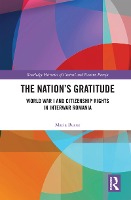A pioneering work for the history of veterans' rights in Romania, this study brings into focus the laws and policies the state developed in response to the unprecedented human losses in World War I. It features in lively and accessible language the varied responses of veterans, widows, and orphans to those policies. The analysis emphasizes how ordinary citizens became educated about and used state institutions in ways that highlight the class, ethnic, religious, and gender norms of the day. The book offers a vivid case study of how disability as a personal reality for many veterans became a point of policy making, a story that has seen little scholarly interest despite the enormous populations affected by these developments. Overall, the monograph shows how, in the postwar European states, citizenship as engaged practice was shaped by both government policies as well as the interpretation a large and varied group of beneficiaries gave to these policies. The analysis provides insights of great interest to scholars of these themes, while it offers examples of engaged citizenship useful for an undergraduate and non-specialist audience.

